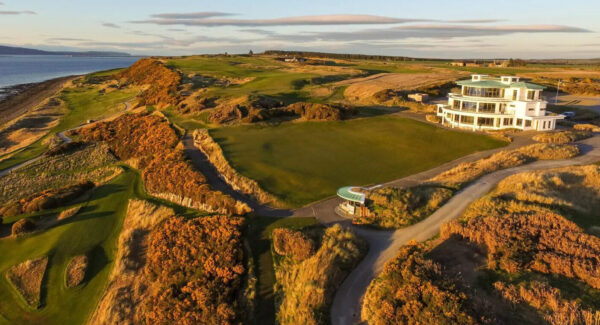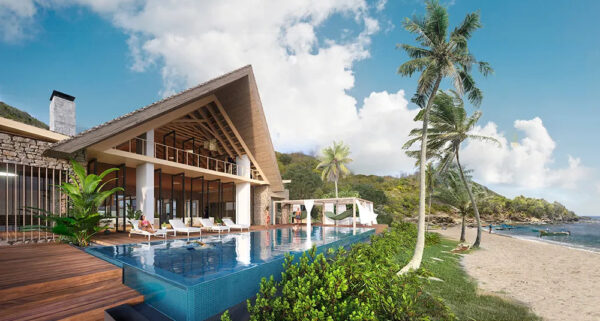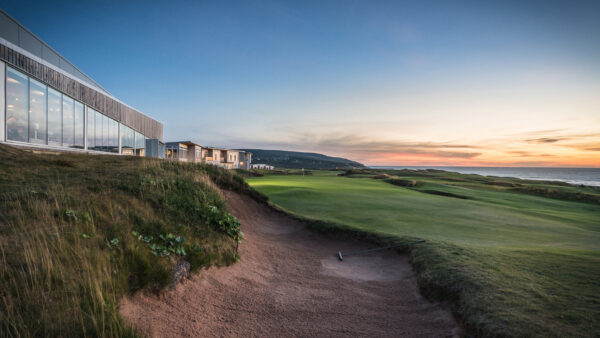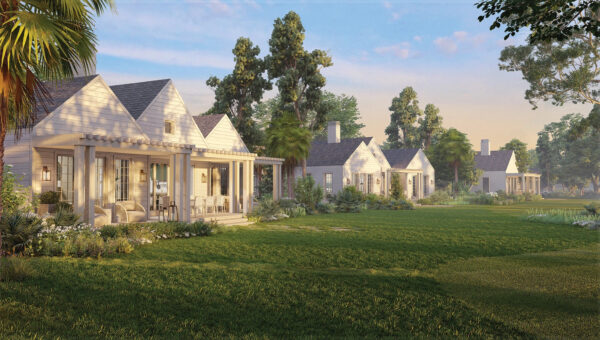Ben Cowan-Dewar, CEO and co-founder of golf brand Cabot, is expanding and refining the company by establishing global footholds. Already transformed from a depleted coal mine into a network of five breathtaking properties—Cabot Cape Breton in Nova Scotia, Cabot Saint Lucia in the Caribbean, Cabot Citrus Farms in Florida, and Cabot Highlands in Scotland—the forthcoming Cabot Revelstoke in British Columbia is slated for a 2025 launch.
Cabot offers high-end residential and boutique resort experiences set against a backdrop of diverse and captivating landscapes. Driving this international venture is Cowan-Dewar, whose journey parallels his initial Cape Breton endeavor, marked by astute partnership choices and calculated risk-taking.
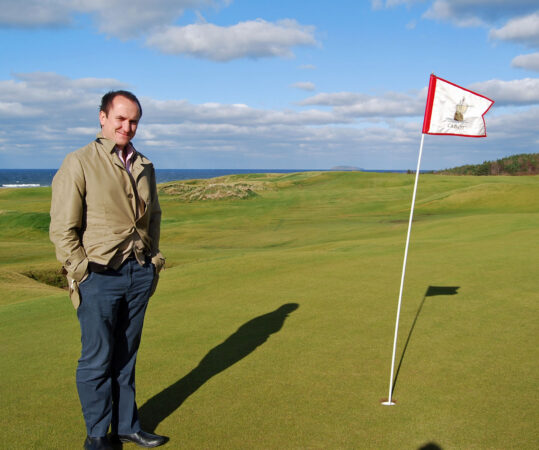
Cowan-Dewar at Cabot Cape Breton
EMERGING FROM MODEST BEGINNINGS
Cowan-Dewar grew up in a small town east of Toronto, with a stockbroker father and a physician mother. Family is what kindled his passion for golf, as he went on golf holidays with his father and would play in Florida with his grandfather. He began designing golf courses at a young age, drawing golf holes inspired by watching the pros on television. He built his first golf hole at age 12, containing seven tees.
Though he enjoyed the sport aspect, what really stood out to him was how golf connects people to each other and to geography. It was a way to see the world and meet new people, and he would pore over the World Atlas of Golf and dream of playing each course. During his teens he explored some of Canada’s farther-flung areas, embarking on a 1,100-kilometer canoe trip from Yellowknife to the Arctic Ocean.
His passion for golf was rekindled via this love of travel during his time at university, when he started Golf Travel Impresarios, which functioned as a tour operator and travel agency. He was able to leverage his knowledge of digital marketing to break into the business at a time when the internet was fairly new, and would travel the world’s greatest courses to take photos and gather content. This inspired him to build his own golf course.
At age 24 he began looking for the perfect spot. Wherever he saw land, he saw golf holes, but he didn’t want to build just any old course: He wanted to build something so spectacular it would rank in the Top 100 Courses in the World. In 2004, he found a suitable spot in Nova Scotia and acquired 40 parcels to develop. But the site was distant from major cities. On top of that, he faced a steep learning curve. “I hadn’t done it before,” he tells CSQ. “I hadn’t been a developer. I hadn’t been an architect. I wasn’t a golf pro.”
What he did find was a backer who had that experience. Cowan-Dewar connected with Mike Keiser, who built Bandon Dunes Golf Resort in Oregon, and the two got to work.
“I really admire Mike,” Cowan-Dewar says. “He’s been my friend and mentor and he’s a wonderful, community-minded person. But what happened with our first project was really against all odds. There were so many people that thought it was an insane idea and would say hateful things about how it would never work.”
He credits his wife, Allie, as his most staunch supporter. The two met in high school and had been married seven years when he came home one day and told her he wanted to build a golf course in the middle of nowhere.
Such a risk might seem steep to an outsider, but Cowan-Dewar explains it differently. “Great entrepreneurs are way better at mitigating risk than people think,” he says. “Effectively what they’re trying to do is de-risk the entire thing. If you’re surviving, you might be making lots of mistakes, but you’re learning from them.”
Allie saw the potential too, so they moved to Nova Scotia and began work on what is now Cabot Links and Cabot Cliffs at Cabot Cape Breton, which now rank 39 and 10 in Golf Digest’s World’s Top 100. During their seven years there, the couple had three children. As business and family life grew, they decided to move to Toronto to set up Cabot’s home office.
- Cabot Highlands
- Cabot Saint Lucia
- Cabot Cape Breton
- Cabot Citrus Farms
MAINTAINING STRONG LINKS
To keep everything functioning smoothly, Cowan-Dewar sees his role as creating and maintaining conduits of communication between the properties so that the best ideas all get shared. Managing people across five major Cabot sites is a challenge, partly because of their distant locations, but also because of the scale of each operation. Cabot Cape Breton has over 500 employees, whereas Cabot Saint Lucia has far fewer at this time. The mature sites like Cabot Cape Breton have large operational teams with a small construction team, whereas the acquired properties of Cabot Citrus and Cabot Highlands are currently undergoing major renovations.
With so much going on, what once seemed like a long shot now seems inevitable, but Cowan-Dewar is mindful of the journey. “It’s one foot in front of the other for a really long time,” he says. “It’s one of those things that seems like an overnight success—it only takes 20 years!”
KEEPING IT GREEN
Developing real estate requires a visionary approach, and Cowan-Dewar is always mindful of the future. He draws inspiration from St. Andrews, the Scotland golf course that has been in operation for 500 years.
“The work you’ve done is going to be in these communities long after you’re gone,” he says. “You need to take care of the land and the communities, so really you need to think of yourself as a steward.”
This necessity for sustainability is rooted in golf quite literally: When choosing the grass for the course at Cape Breton, Cabot used the fescue grasses already prominent in Nova Scotia to make up the links. Fescue is salt tolerant, stabilizes the dunes beneath, and doesn’t disrupt the established environment. Similar decisions in minimizing water usage, managing erosion, and providing habitats for local wildlife have earned Cabot Cape Breton the designation of a Certified Audubon Cooperative Sanctuary, with upcoming Cabot properties to follow suit.
The longevity of a course requires not just environmental sustainability, but also community stability. “The people are so much a part of it,” Cowan-Dewar says. “Being able to employ the wonderful people who are in these great places—that’s at the core of making these operations sustainable.”
TURNING FLUBS INTO FLYERS
The COVID pandemic had a silver lining for golf, as outdoor activities became one of the few safe places people could meet. And as remote work surged, scenic lodgings and homes away from the city saw a boom.
“We sold lots of vacation real estate everywhere,” Cowan-Dewar says. “But it was particularly unbelievable in Saint Lucia because people couldn’t fly there.” Cabot Saint Lucia wasn’t even open yet at the time. It became clear that a trend was emerging: combining remote work and gorgeous settings. “Everybody that’s been coming down has truly loved the island. It’s 83ºF and sunny every day of the year, and Saint Lucia is a really dramatic, majestic place.”
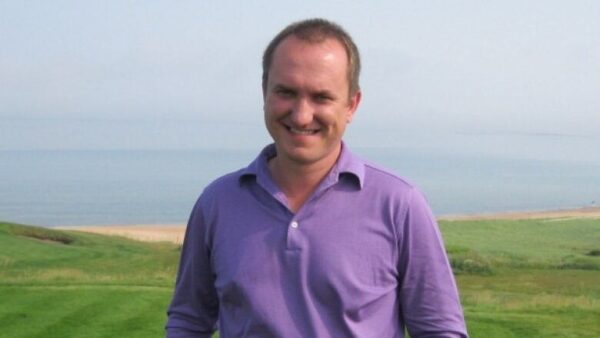
Cowan-Dewar at a Cabot course in Inverness
PLAYING THE LONG GAME
With preview play already underway at Cabot Saint Lucia and the grand opening in December, Cowan-Dewar is excited to see the golf world’s reaction. Meanwhile, he’s always on the lookout for new spots to build his next course.
“I can’t get a job doing anything else,” he says with a laugh. “I just keep working at it. Lots of my favorite folks in business are all still active in their 70s and 80s, which tells you they’re doing something they love.”
For those new to the business, he offers words of wisdom. “If you really believe in an idea, it’s just hard work and perseverance,” he says. “It’s a lot harder than people imagine, and there will be endless naysayers along the way, but if you’ve got a great idea, just stick with it. That’s really all it is.”







































